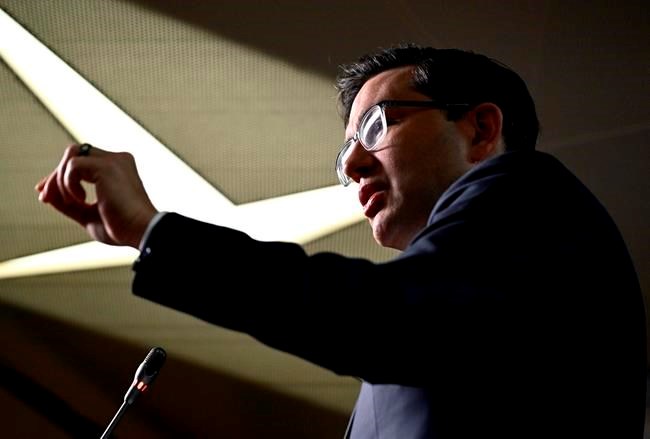OTTAWA ŌĆö Conservative Leader Pierre Poilievre says his choice for Bank of sa╣·╝╩┤½├Į governor would be someone focused entirely on keeping annual inflation at its two per cent target.
The Opposition leader made the comments on Friday as he stood by the promise he made during the Conservative leadership campaign to fire the current central bank governor, Tiff Macklem, should he become prime minister.
"He will be replaced with someone who has experience in the central banking system that will have as his or her singular objective to keep inflation at the two per cent target while protecting financial stability," Poilievre said during an end-of-year news conference on Parliament Hill.
"I think that is a reasonable thing to request."
Poilievre added that a Conservative government would cut spending and reduce the deficit to help bring down inflation so that higher interest rates are no longer necessary, while leaving monetary policy up to the independent central bank.
"The right policy ŌĆö and the one that I would implement ŌĆö is to bring the deficits down, and in the process, bring inflation down," Poilievre said. "Right now, the cost of government is increasing the cost of living."
Appointed to a seven-year term as head of the Bank of sa╣·╝╩┤½├Į in June 2020, Macklem has become a key target for Poilievre, first during his run for the Conservative leadership, and now in his push to become prime minister.┬Ā
That has come as Canadians have spent most of the past year grappling with the highest levels of inflation seen in nearly 40 years, with the rising cost of living associated with more expensive groceries and other goods exacerbating pre-existing affordability concerns.
Experts have blamed a slew of factors, including global events such as Russia's invasion of Ukraine and supply-chain disruptions.
But there's also been increasing focus on domestic factors, including fiscal and monetary stimulus during the pandemic.
The federal government responded to COVID-19 with a range of pandemic support programs that delivered billions of dollars to people and businesses to mitigate financial losses from lockdowns.
The Bank of sa╣·╝╩┤½├Į also injected stimulus into the economy by slashing interest rates to near zero and buying up government bonds to lower rates even further and encourage spending, a strategy followed by other central banks worldwide.
That stimulus was likely excessive, the Bank of sa╣·╝╩┤½├Į now acknowledges.
Poilievre said his beef with Macklem is not with the Bank of sa╣·╝╩┤½├Į governor's monetary policy, which involves setting interest rates to help keep inflation under control.
He instead argued that Macklem strayed into fiscal policy by "printing money" to buy government bonds, which he characterized as support for Liberal spending during the COVID-19 pandemic.
"He's supposed to be in charge of monetary policy and not fiscal policy," Poilievre said. "And he printed the money to fund those deficits, and he did so in an inflationary environment. And that is why I believe he needs to be replaced."
Poilievre also criticized Macklem for having promised in July 2020 that interest rates would remain "low for a long time." The Conservative leader said that led many Canadians to take on large mortgages that they no longer afford.
The Bank of sa╣·╝╩┤½├Į has raised interest rates seven times this year in an attempt to get skyrocketing inflation under control. The central bank's benchmark interest rate is currently at 4.25 per cent, compared to 0.25 per cent in July 2020.
This report by The Canadian Press was first published Dec. 30, 2022.
Lee Berthiaume, The Canadian Press



